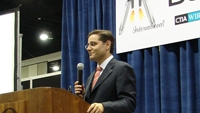FCC chairman warns of a looming spectrum crisis

Julius Genachowski, chairman of the FCC, warned last week of “a looming spectrum crisis” if the federal government fails to find ways to come up with additional bandwidth for fast growing mobile computing technology.
Genachowski said the FCC is already tripling the amount of spectrum available for commercial uses. However, wireless traffic is increasing faster than the spectrum allocation — at least 30 times — due to the rapid growth of online video and other bandwidth-heavy applications.
The chairman outlined a four-part strategy for U.S. wireless communications, focusing on finding additional spectrum, removing obstacles to 4G (fourth-generation) deployments, creating an open Internet and nurturing competition.
In a speech last week to the CTIA Wireless I.T. & Entertainment conference in San Diego, the chairman said new spectrum allocation is a top commission priority and promised “a full-throated, strategic look” at how to close that gap between supply and demand. The review, he said, will consider reallocating existing spectrum now used for other purposes and encouraging development of new technologies that use spectrum more efficiently.
The FCC has already raised tens of billions of dollars by auctioning off analog television airwaves to the nation’s largest wireless carriers and has opened spectrum for unlicensed uses such as Wi-Fi connections. Last year, the commission voted to allow the use of white spaces to deliver wireless broadband services.
Still, Genachowski said, much more spectrum is needed, adding there are “no easy pickings” to strip spectrum now used for other purposes. Yet, he emphasized, there is no other choice. Spectrum will have to be reallocated from other uses to mobile broadband.
In a letter to the FCC last week, the CTIA asked the agency to make an additional 800MHz of spectrum available for mobile broadband over the next six years.
The professional video industry's #1 source for news, trends and product and tech information. Sign up below.
“Exactly how much spectrum we’ll need to close the gap, we don’t know yet, and that will be part of the ongoing processes that we’ll run,” Genachowski said at a news conference after his speech.
The FCC will also act to break down barriers to 4G deployment, particularly the placement of towers. The agency will soon make a proposal to cut through red tape to speed up the process while taking into consideration the concerns of local authorities, the chairman said.
A third priority is ensuring an open Internet, and a fourth is supporting competition. The chairman said he recognizes that the mobile industry may require a different approach from the wired world in regulating net neutrality and network management, and said the agency will act to ensure greater transparency and participation in the process.
But Genachowski said that he plans to keep the wireless Internet open. And he emphasized that the agency’s net neutrality principles, which will soon become official regulation, will also apply to wireless networks.
That does not sit well with Ralph de la Vega, president and CEO of AT&T Mobility and Consumer Markets, who has resisted the FCC’s plans to extend net neutrality principles to the wireless market.
De la Vega has argued that imposing the same policy rules on wireless networks as it applies to wired networks is not a good idea. And he said that it is unfair for the FCC to impose any rules on wireless operators who have already spent billions of dollars buying licenses for wireless spectrum.
